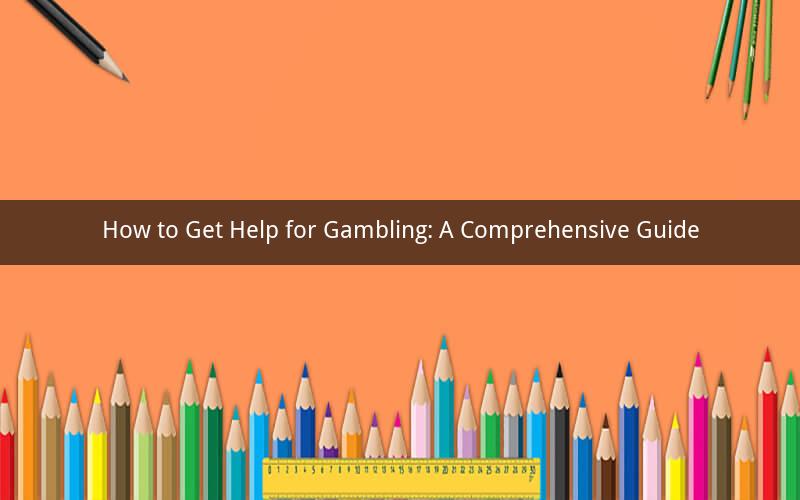
Introduction:
Gambling addiction is a serious issue that affects millions of people worldwide. It can lead to financial, emotional, and social problems. If you or someone you know is struggling with a gambling addiction, it's crucial to seek help. This article provides a comprehensive guide on how to get help for gambling, including identifying the signs of addiction, finding treatment options, and maintaining a healthy lifestyle.
1. Identifying the Signs of Gambling Addiction
Recognizing the signs of gambling addiction is the first step towards seeking help. Here are some common indicators:
- Feeling the urge to gamble, often leading to unsuccessful attempts to stop.
- Experiencing financial difficulties due to gambling debts.
- Spending more time and money on gambling than intended.
- Lying to family, friends, or employers about gambling activities.
- Neglecting responsibilities and personal relationships due to gambling.
2. Finding Treatment Options
Once you acknowledge that you have a gambling addiction, it's essential to seek treatment. Here are some treatment options available:
- Therapy: Professional therapy, such as cognitive-behavioral therapy (CBT), can help individuals develop healthier coping mechanisms and address underlying issues contributing to their addiction.
- Support groups: Joining a support group, such as Gamblers Anonymous, can provide a sense of community and understanding from others who have faced similar challenges.
- Inpatient rehab: Residential treatment programs offer a structured environment to help individuals overcome their addiction, providing 24/7 support and resources.
- Outpatient rehab: Outpatient programs allow individuals to receive treatment while living at home, balancing work and personal responsibilities.
3. Support from Family and Friends
Support from loved ones is crucial in overcoming a gambling addiction. Here's how family and friends can help:
- Encourage the individual to seek help: Offer support and encouragement to seek treatment or join support groups.
- Be patient and understanding: Understand that recovery is a challenging process, and patience is key.
- Offer to attend therapy sessions or support group meetings: Joining these sessions can provide additional support and understanding.
- Provide a safe and supportive environment: Encourage the individual to focus on their recovery and avoid triggers that may lead to relapse.
4. Maintaining a Healthy Lifestyle
A healthy lifestyle can significantly contribute to overcoming a gambling addiction. Here are some tips:
- Establish a routine: Develop a daily routine that includes exercise, healthy eating, and relaxation techniques.
- Practice stress management: Find healthy ways to cope with stress, such as meditation, yoga, or hobbies.
- Surround yourself with positive influences: Spend time with friends and family who support your recovery and avoid negative influences.
- Set goals and monitor progress: Set realistic goals and track your progress to stay motivated and focused on your recovery journey.
5. Aftercare and Relapse Prevention
After completing treatment, it's crucial to maintain a strong support system and continue working on your recovery. Here are some tips for aftercare and relapse prevention:
- Attend support group meetings regularly: Joining a support group can provide ongoing support and guidance.
- Continue therapy sessions: Regular therapy sessions can help address any underlying issues and provide ongoing support.
- Develop a relapse prevention plan: Identify potential triggers and develop strategies to cope with them effectively.
- Stay connected with loved ones: Maintain a strong support system to help you stay on track with your recovery journey.
Frequently Asked Questions:
1. Q: Can I overcome a gambling addiction on my own?
A: While it's possible to overcome a gambling addiction with self-help strategies, seeking professional help and joining support groups can significantly increase your chances of success.
2. Q: How long does it take to recover from a gambling addiction?
A: The duration of recovery varies for each individual. Some may experience immediate improvement, while others may require ongoing treatment and support for several years.
3. Q: Can I still enjoy gambling in moderation after recovery?
A: Many individuals who have overcome a gambling addiction can enjoy gambling in moderation. However, it's essential to set boundaries and avoid triggers that may lead to relapse.
4. Q: What if I relapse after seeking help?
A: Relapse is a common part of the recovery process. If you experience a relapse, it's crucial to seek support from your therapist, support group, or loved ones and recommit to your recovery journey.
5. Q: Can I recover from a gambling addiction if I have a co-occurring mental health disorder?
A: Yes, it's possible to recover from a gambling addiction even if you have a co-occurring mental health disorder. Treatment for both conditions simultaneously can significantly improve your chances of successful recovery.